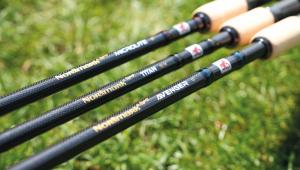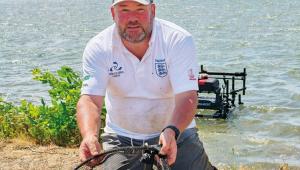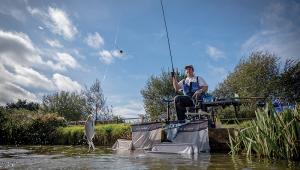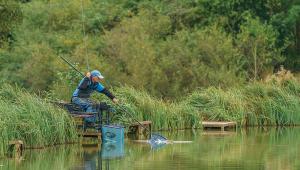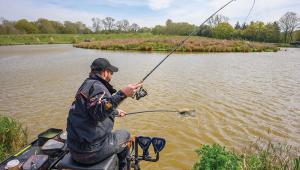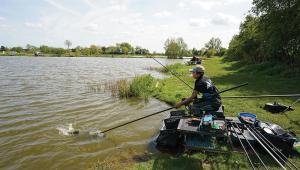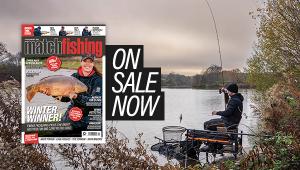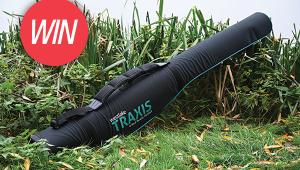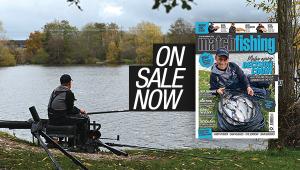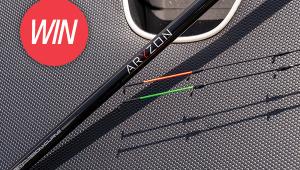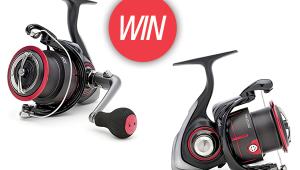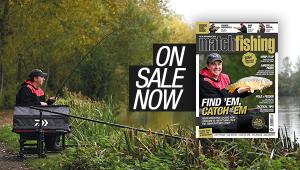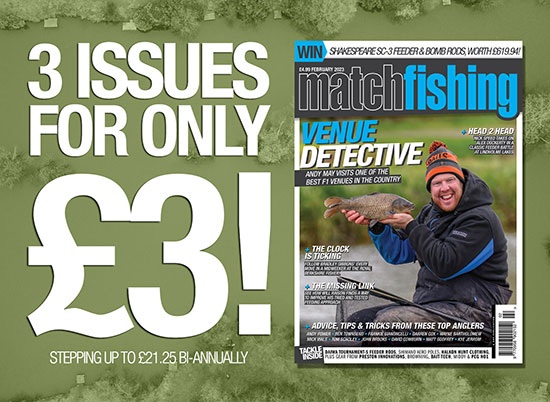Big Interview – Des Shipp
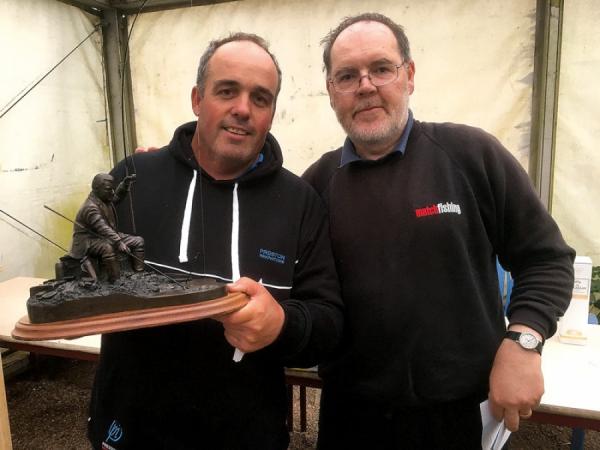
David Haynes continues his conversation with the genial big guy, Des Shipp.
DH: You’ve been a regular in the England setup for how long now?
DS: About 13 years, I think it is.
DH: How did that come about?
DS: I was fishing for Dorking and those people that fish for England basically come through Starlets, Barnsley and Dorking – they’re the three teams from which the England team normally gets chosen.
I had good success with Dorking, then I started fishing the Sensas Challenge matches, which are really important with Mark Downes there, the England captain, and I did well in some of them. Then I had a phone call from Mark Addy, and he said: “We want you to come and fish the Home International at Port Talbot Dock in Wales.” We went there and did a bit of practising; it was mega deep – 11 metres to hand deep – so it wasn’t the greatest of venues to go on for your first England appearance.
To be fair the fishing was quite good and I won my section on the Saturday, I can’t remember what weight, around 12lb I think. You’d got the French internationals there too and I actually had Alain Dewimille in my section who now fishes for the French national team and I beat him by a couple of pounds, but my nerves were just ridiculous.
But what happened then was we had a massive storm overnight and the river that runs into Port Talbot Dock turned it from gin-clear to chocolate brown. We won it on the first day and all did terribly on the second day, the French absolutely annihilated it. I came last in my section, so I’ve gone from hero to zero in 12 hours and I thought I’d blown it. But the rest of the team didn’t do any good either and we just got it wrong on the day, and I was gutted, absolutely devastated and thought that was the end of it.
It dwelled on me for weeks and weeks, and I didn’t know what to do because when you’ve got your sponsors they probably think you’ve got a chance of fishing for your country. I’ve never told anybody this but in the end I actually phoned Mark Addy up after a month or so because it was doing my head in and said: “I have to ask you, tell me the truth, do you think I’ll ever fish for England again after what happened?” He basically said they didn’t know yet because I’d just fished my first Home International so see how it goes. I put the phone down and still wasn’t clear what was going to happen.
The following year I got a call from Mark Downes saying they wanted me to come to the European Champs in Holland (or was it Belgium?) on a canal. He wasn’t saying I was going to fish but they wanted me to see how it was all done. I went there and I actually fished both days – I think I came something like eighth or ninth individually. The fishing was really hard and I came fifth in my section on the Saturday and won my section on the Sunday. And that was it, the following year I fished both the European and the World Champs.
DH: Have you ever been close to winning it individually?
DS: You’re always close, David, there’s always one bite here, there or anywhere, but whether it happens or not is a different matter. You never think about that when you’re fishing, you’re fishing as a team. You’re never fishing individually, unless the team might have done really badly and say if one of us has won their section the management might turn round and say: “Look, we’re never going to win so fish for your section or fish for a big fish.” But that hasn’t happened, we go there as a team and that’s what it’s all about.
I don’t even think about it; it’s not until after the match when you’ve actually finished and you find out the results that you think: “If I’d have just had that one bite on that long pole fishing for a bream I could have had an individual medal.” It just doesn’t compute until after the match, because in the match you’re fishing for the points, you’re fishing to win as a team.
I’ve always looked at individual medals like this; you’ve only won an individual medal because the rest of the team has helped you win it. If it wasn’t for the rest of the team sorting out the tactics, how to catch the fish, you wouldn’t have won that medal anyway. You’ve still got ability and you’ve got to have that little bit of luck on the day, but that’s the way I look at it.
DH: And how long before the young guns in the team are pushing you for your place?
DS: You don’t know; it could be next year, it could be 10 years. I try not to think about it; every time I get selected I just go and do my thing and that’s it.
DH: Do you think those coming through the Under 21s setup have the all-round ability needed?
DS: I think now, and I’ve always said it, that I will probably be the last person ever to fish for England who hasn’t gone through the junior setup. Everyone else now will have to go through the junior selection process.
DH: It used to be said that match fishing was one of the few sports where ordinary people could compete next to world champions. Do you think that’s still true, or is there a big gulf now between club anglers and semi-pro or pro anglers?
DS: There are lots of individual things now, because team fishing, while it hasn’t died, is definitely a lot smaller than it was. Some of that is to do with age; take my river for example, it’s a brilliant river, and if you could drive to your peg I’m sure it would revive the whole river scene. Some clubs have already tried doing it and it is working, because it’s all about convenience. It doesn’t matter what you do nowadays convenience is important, where you can drive your vehicle near to where you’re fishing, you don’t have to carry loads of gear – people just don’t want to do it.
I look at Evesham as the perfect example of it; if you had to walk a mile to go and fish Evesham would you bother? Probably not. But because you can drive to every peg there, you’re sat on a little platform, it’s sold out every week.
I look at that and I can’t believe that a lot more clubs haven’t said to the farmer, right, let’s sit round the table and come up with a deal where you put a track in so we can drive to the pegs and we’ll pay you so much a year for it, or we’ll pay you so much per match to let us use your track as an access. It needs to happen, because if it doesn’t happen I honestly think the rivers will just dwindle.
DH: Do you think it’s any coincidence that the ‘glory days’ of river fishing happened when everything was much simpler and you just had a basket or box and two or three rods and you could easily walk to the pegs.
DS: Exactly. And, to be honest, there weren’t all these other fisheries about, ‘diluting’ the river fishing, because people don’t have to go on rivers any more. As soon as you put things in their way, like walking or not being able to get in their pegs because the banks are terrible, people say: “I tell you what, I’ll just go on the lakes.”
But if you give them the opportunity to drive to their pegs, and sit on a platform – if you have a bad day you have a bad day, at least you haven’t got to walk a mile, and you haven’t got to wear chest waders, people will do it. Evesham is a classic example that it can happen; clubs need to change their ways. It’s not easy but there is a way of doing it.
DH: As an all-rounder, do you have any favourite methods? What would be your ideal match?
DS: My ideal match… I’m not fussed really, I just love a mixed fishery where I’m catching skimmers, roach, using natural baits like casters, maggots, groundbait, I just love that style of fishing. I’m not really fussed about baits though, a bait’s a bait and if you’re catching fish on it it works, that’s what it’s about.
But I love river fishing, I love going on the rivers where you can ball it in, chuck 10 balls of groundbait in and catch on maggots over it. I love that way of fishing, I think it’s great.
DH: How much prep do you do?
DS: Loads. I remember Steve Gardener, when I first went to Port Talbot Dock in the Home International, came up to me – I actually had a Boss box at the time and I don’t know if you remember but Boss boxes had these little tiny metal balling arms – and he said: “Des, you cannot fish like that. You have to get your setup right, you can’t fish like you are, it’s just not right – you’ve got top kits on the floor! You’ve got to think about your prep!” And this is how it’s progressed over 10 years, it’s amazing how it’s gone on. Ever since that day I’ve got into a system where I just do it.
I don’t confuse things, I’ve got a selection of floats – obviously floats change and everything moves on – and once I’ve got a few that I’m happy with, like the ones I’m using now, I’ll tie those on three different lines so I can go to an F1 lake, or a roach lake, whatever; I don’t have millions of different floats, I just have a few different floats on different main lines. And that’s my prep. I don’t go overboard, some weeks I do none, some weeks I do loads, but I do try and stay on top of it.
Last night, for example, I tied six rigs in my garage, because I’ve got a festival coming up and I’ll do maybe three or four rigs a night. Sometimes I spend a long time in the garage but I try and do an hour here, an hour there, so I do quite a bit. Just stay on top of it. I try and do the right prep, I’m not doing it for the sake of it. I do the right floats or the right hooks for what I’ve got coming up.
DH: In our last Big Interview Jamie Hughes commented that fishing is a very selfish sport. How do you strike a balance with your life outside of fishing?
DS: I think it’s selfish to your family, and I’ve said to my missus about that, I’ve been totally straight with her, saying I’m sorry and I’ve not spent enough time with her and the kids but for me, the same as Jamie, when it’s your life, your job and you’re earning money from it what can you do? You need money to survive, and I think it is selfish in that respect to your family. It’s like any sport, if you get good at it you have to put time into it.
It’s an evil circle, because if you’re being paid to go fishing by your sponsor you need to stay on top of your game, stay at the top, for them to keep sponsoring you.
And I’ve always had that thing about it where with Preston I want to do as much as I can so they’ll never have an excuse to turn round to me and say: “Actually Des, we think time’s up now, you’re not doing enough.” I don’t want that. I want to do my job the best I can so I don’t get that phone call.
But every sport is selfish like that.
DH: What would you say was your best match win or your finest moment if your match fishing career?
DS: Winning my first match, I’ll never forget that. Obviously getting my first gold medal with the England team, in… now you’re asking… I never remember dates, I just keep putting them on the mantelpiece… 2007 was it? (It was actually 2005, in Finland – DH)
DH: Have you any idea how many medals you’ve won in all?
DS: I’ve got five World gold team medals, a few silvers and bronze, I can’t remember how many, a few. There’s only been two years when we’ve not won a medal, so we’ve got quite a few. And the Europeans too.
But I’m not the sort of person to look back like that, I just want to go out and compete, win a medal and bring it home, I don’t keep any records.
DH: Anything you might consider your worst moment?
DS: (Laughs) Yea, it was last year, in the World Champs in Bulgaria. I actually lost a carp. I was doing really well in my section and Mark Addy said: “Look, you’re walking the section, just see if you can catch a carp. I hooked a carp on the slider, it was a good one about 4 to 5lb, most of the others were much smaller than that, played it all the way back to the net, lifted my rod up and I could see this carp because it was quite clear, then it’s nodded its head so quick that it snapped the 0.14mm hooklength. I felt physically sick – if I’d got that out I could have sat in the car for the rest of the match, and I didn’t find this out until later, but if I’d got that out I would have had the silver individual.
But the team got a bronze medal. As I said, it’s the little things, it’s not until you start looking at things afterwards that you think: “If I’d have just done that…”
DH: Do you have a favourite venue?
DS: On natural venues I like the Bristol Avon in September time, I just go down there on my own when I’ve got some free time. I just love it, love running water. But I like loads of places; Bitterwell Lake, that’s where I started fishing on my own, going down in winter when it’s rock hard I just love that, it’s a challenge.
DH: As we’ve discussed, you’ve won all colours of team medals for England, you’ve been at the top with Dorking for a long time and won many big-money top matches individually, including our very own David Hall Trophy match…
DS: That was obviously the best…
DH: … so what ambitions do you have left?
DS: I don’t have ambitions, really. I just go along, I like fishing all sorts of different matches. Obviously like everybody I would like to win the big matches, like the Maver Match This. I walked the bank at a lot of the feeder matches this year doing some promotional work and that looks a really good competition, but I just enjoy doing what I do.
I just want to keep fishing for England as long as I can and just keep enjoying what I’m doing. I enjoy fishing matches whether they’re 100 pegs or 20 pegs. Any match to me is a match.
DH: Is that what drives you on to keep on match fishing, the feeling of winning?
DS: When you turn up at a match, no matter what match it is, or what venue, you’re under more pressure because of who you are, so to many of the others if they beat you that’s their day.
DH: You’re now the target.
DS: Of course. If you beat them it’s “well we knew that was going to happen,” but if they beat you that makes their day… and I try and stop that from happening.
DH: Are the big-money matches a pull for you? Do you think the money is a good thing?
DS: I think you’ve got to have it; it’s so obvious it works, it gets people out there fishing. For me personally I don’t chase them, never have done. If I didn’t fish for England and I didn’t have other commitments I would probably have more of a go at them.
But I’ve seen a lot of the bad things about some of the finals, I’m not going to mention which they are but I go to some venues and they cannot take the amount of people on it. And that’s the turn-off for me. They put in areas on lakes that are not capable of competing, and I know that can happen on all lakes on all venues, but they have to think about it. People travel a long way for them.
I remember one guy came up to me once and told me which peg he’d drawn, and I knew the venue very well and just told him he might as well go home.
He said: “What do you mean? I’ve travelled five hours to get here.” I said: “Listen, you’re not going to catch anything because they never put it in matches.” And I thought that isn’t right, and I wish they would just limit the pegs. I know they’re trying to collect a load of money but just limit the pegs so everyone has a day’s fishing and that competition will go on forever.
But I think it’s getting to a stage where people get peeved with it, and they don’t turn up, so someone gets a spare couple of pegs and ends up winning. It’s all gone a little bit funny and just needs sorting out.
DH: Do you still go in for it?
DS: No, not really. Very rare. I’m not the sort of bloke who does his diary at the start of the year and says I’m going to do this and do that, I normally just run along and get in a right mess with it. I don’t know what’s going on – I’m sort of a two-week person, a fortnight in front not a year ahead. And obviously there are England commitments, and I’m committed to stuff with Preston, and I’m quite reluctant to go into things full-on when I have other commitments.
DH: Does it ever stop being enjoyable and become just another job?
DS: It hasn’t for me, not yet. No. I’m doing my hobby as my job – it doesn’t get better than that, does it? The thing with me is I’ve worked for 20-odd years of my life, and I look back on clocking in and clocking out, with a set of rules you have to abide by, and that’s when you think: “I’m actually very lucky. Extremely lucky.”
DH: Finally, if you only had one day left to go fishing, where would you go, what would you like to catch and who would you like to beat off the next peg?
DS: (Laughs) Erm, I’d like to just catch a great big net of quality roach on the river, and I’d give Will Raison a bit of a tanning – I catch 40lb of big dog roach and he catches 3lb!
DH: Des Shipp, thank you very much, it’s been a pleasure listening to you.
- Log in or register to post comments
